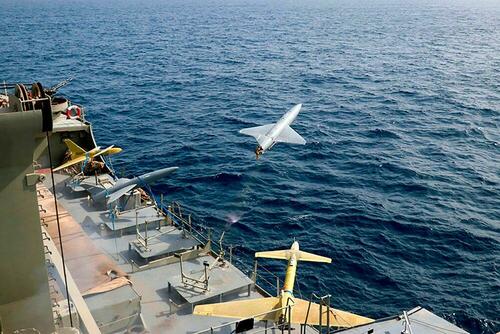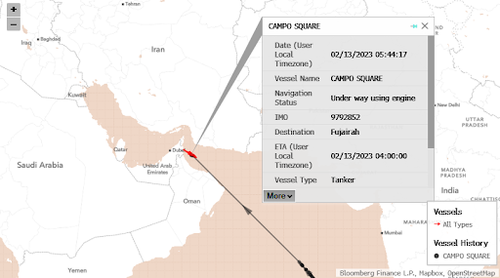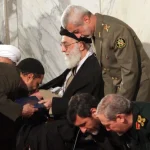
Israeli media on Friday revealed a major incident in the Persian Gulf involving an alleged attack on an Israeli owned oil tanker. The BBC's Persian language service was the first to allude to it, while the Saudi newspaper Elaph also reported it, and the reports indicate it occurred last week but is only now being revealed.
"Foreign officials said on Friday evening that the Iranian Revolutionary Guards Corps launched a Shahed 136-type drone in the Persian Gulf towards the Campo Square oil tanker, which is owned by Israeli businessman Eyal Ofer," Israel National News Arutz Sheva reports.

The tanker sails under the Liberian flag, but Israeli defense officials presented the attack as a retaliation attempt for past alleged Israeli operations against Iran, and described no injuries.
It's not the first instance of such an alleged Iranian drone operation against tankers in these waters, with a November incident also believed an IRGC military operation to target Israeli shipping.
The Islamic Republic and Israel have long been in a de facto state of war, especially given prior years' mysterious sabotage incidents of military sites inside Iran, as well as assassinations of top Iranian nuclear scientists.
Concerning the November incident wherein a projectile hit a tanker off the coast of Oman, the AP noted at the time, "While no one immediately claimed responsibility for the attack, suspicion immediately fell on Iran. Tehran and Israel have been engaged in a years long shadow war in the wider Middle East, with some drone attacks targeting Israeli-associated vessels traveling around the region."
Torbjorn Soltvedt, an analyst at the risk intelligence company Verisk Maplecroft, previously explained, "the risk of attacks against shipping and energy infrastructure in the wider region is rising mainly due to the lack of progress in U.S.-Iranian nuclear diplomacy and the decision by Washington to apply further sanctions pressure on Iran." Soltvedt continued: "Since 2019, Iran has consistently responded to new US sanctions with covert military action in the region."
#BREAKING: IRGC attacks Liberian-flagged crude oil tanker with suicide drones in Gulf of Oman, Israeli media confirms; "Campo Square" tanker is owned by Israeli businessman Eyal Oferhttps://t.co/gZNPkrxn30
— I.E.N. (@BreakingIEN) February 17, 2023
He added: "There is not just an increased risk of disruptive attacks against energy infrastructure in the region, but also a growing risk of a wider military confrontation with more serious consequences for world energy markets."
Israeli media on Friday revealed a major incident in the Persian Gulf involving an alleged attack on an Israeli owned oil tanker. The BBC’s Persian language service was the first to allude to it, while the Saudi newspaper Elaph also reported it, and the reports indicate it occurred last week but is only now being revealed.
“Foreign officials said on Friday evening that the Iranian Revolutionary Guards Corps launched a Shahed 136-type drone in the Persian Gulf towards the Campo Square oil tanker, which is owned by Israeli businessman Eyal Ofer,” Israel National News Arutz Sheva reports.

The tanker sails under the Liberian flag, but Israeli defense officials presented the attack as a retaliation attempt for past alleged Israeli operations against Iran, and described no injuries.
It’s not the first instance of such an alleged Iranian drone operation against tankers in these waters, with a November incident also believed an IRGC military operation to target Israeli shipping.
The Islamic Republic and Israel have long been in a de facto state of war, especially given prior years’ mysterious sabotage incidents of military sites inside Iran, as well as assassinations of top Iranian nuclear scientists.
Concerning the November incident wherein a projectile hit a tanker off the coast of Oman, the AP noted at the time, “While no one immediately claimed responsibility for the attack, suspicion immediately fell on Iran. Tehran and Israel have been engaged in a years long shadow war in the wider Middle East, with some drone attacks targeting Israeli-associated vessels traveling around the region.”
Torbjorn Soltvedt, an analyst at the risk intelligence company Verisk Maplecroft, previously explained, “the risk of attacks against shipping and energy infrastructure in the wider region is rising mainly due to the lack of progress in U.S.-Iranian nuclear diplomacy and the decision by Washington to apply further sanctions pressure on Iran.” Soltvedt continued: “Since 2019, Iran has consistently responded to new US sanctions with covert military action in the region.”
#BREAKING: IRGC attacks Liberian-flagged crude oil tanker with suicide drones in Gulf of Oman, Israeli media confirms; “Campo Square” tanker is owned by Israeli businessman Eyal Oferhttps://t.co/gZNPkrxn30
— I.E.N. (@BreakingIEN) February 17, 2023
He added: “There is not just an increased risk of disruptive attacks against energy infrastructure in the region, but also a growing risk of a wider military confrontation with more serious consequences for world energy markets.”
Loading…







